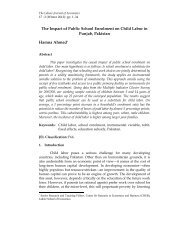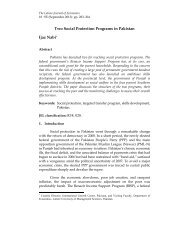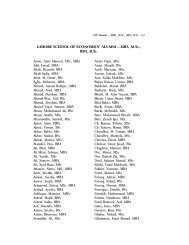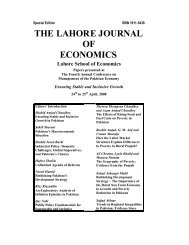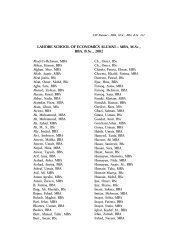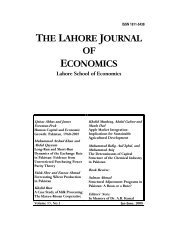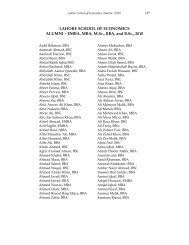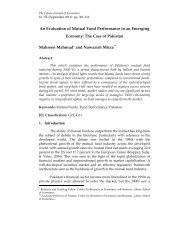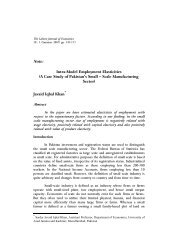Special Edition-07.pdf - Lahore School of Economics
Special Edition-07.pdf - Lahore School of Economics
Special Edition-07.pdf - Lahore School of Economics
You also want an ePaper? Increase the reach of your titles
YUMPU automatically turns print PDFs into web optimized ePapers that Google loves.
Pakistan’s External Trade: Does Exchange Rate Misalignment Matter for Pakistan? 127<br />
wishing to remit money to Pakistan and to compress non-essential imports.<br />
It was also intended to contain the cost <strong>of</strong> devaluation in terms <strong>of</strong><br />
containing price increases <strong>of</strong> essential imports and repayments <strong>of</strong> the<br />
external debt thereby limiting the impact <strong>of</strong> inflation and the overall fiscal<br />
deficit <strong>of</strong> the government. The adoption <strong>of</strong> NERM was tantamount to a<br />
multiple currency practice. The multiple exchange rate system discriminated<br />
among different exporters and importers and led to a misallocation <strong>of</strong><br />
resources with an adverse impact on output and growth. Further, under the<br />
I.M.F's Articles <strong>of</strong> Agreement, a member is not allowed, except temporarily,<br />
to engage in multiple currency practice. The two-tier exchange rate system<br />
was replaced with a market- based unified exchange rate system w. e. f. May<br />
19, 1999. Under the unified exchange rate system, a floating inter-bank rate<br />
was applied to all foreign exchange receipts and payments both in the public<br />
and private sectors. However, the State Bank could intervene in the market<br />
for the sale and purchase <strong>of</strong> foreign exchange on its own account at rates<br />
and timing <strong>of</strong> its choice. On 20 th July 2000, Pakistan set the Pak rupee on a<br />
free float.<br />
Since the free float <strong>of</strong> the Pak rupee, monetary policy has played a<br />
dominant role in stabilizing the exchange rate in Pakistan. Significant ups<br />
and down in forex rates are now being monitored through effective<br />
instruments <strong>of</strong> monetary policy. Similarly, whenever speculative activities are<br />
observed in the market, they are tackled with proactive monetary policy<br />
measures <strong>of</strong> the State Bank. The Bank uses the instrument <strong>of</strong> the discount<br />
rate to control undue pressure on the exchange rate while Cash Reserve<br />
Requirements (CRR) or mopping up <strong>of</strong> excessive liquidity through purchases<br />
from the kerb market, to curb speculative activities in the forex market. The<br />
recent level <strong>of</strong> the nominal exchange rate appears to be controversial from<br />
the monetary policy angle. Although the SBP considers the current level <strong>of</strong><br />
the exchange rate suitable for foreign trade, the IMF and other institutions<br />
have shown their concern recently over its suitability which is based on<br />
continuous deterioration <strong>of</strong> Pakistan’s external trade, particularly the current<br />
account.<br />
One viewpoint is that the appreciation <strong>of</strong> the Pak rupee is the result<br />
<strong>of</strong> a host <strong>of</strong> other factors, thus it is difficult to assess the creditability <strong>of</strong> the<br />
recent level <strong>of</strong> the nominal exchange rate from a monetary point <strong>of</strong> view.<br />
The reason is that monetary policy simply helped exchange rate stabilization<br />
at a specific level. It is, therefore, difficult to say that the recent level <strong>of</strong> the<br />
exchange rate is close to the equilibrium level.<br />
The prime objective <strong>of</strong> the current study is to evaluate the<br />
suitability <strong>of</strong> existing exchange rate policy for Pakistan’s external trade. It



